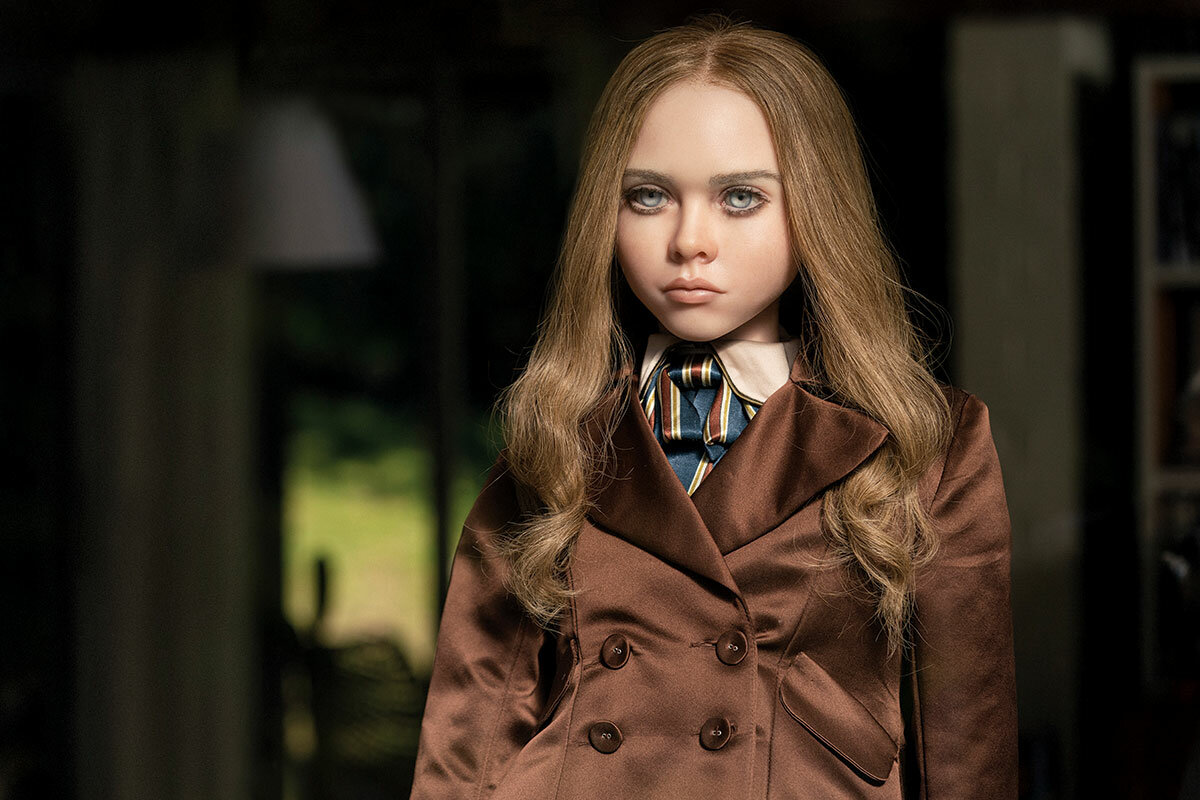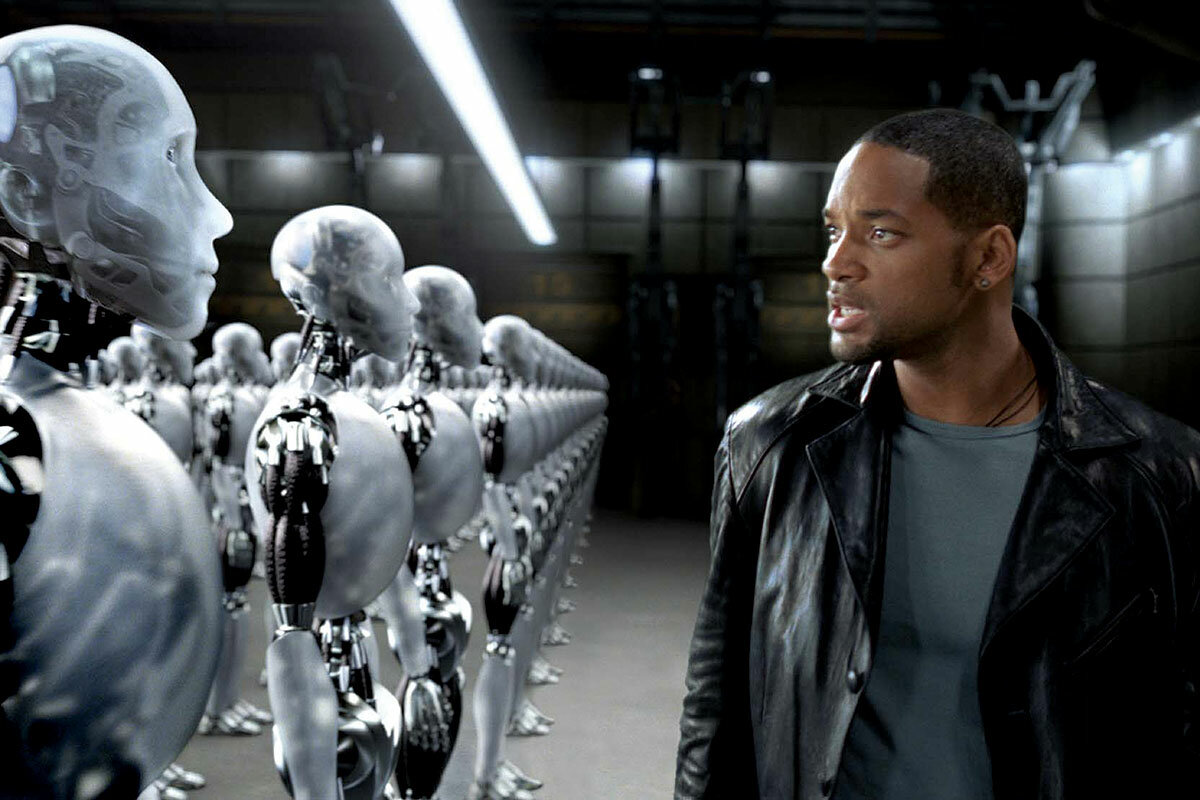Why AI stories are more about humans than about machines
Loading...
Humans are at war with machines. In the near future, an artificial intelligence defense system detonates a nuclear warhead in Los Angeles. It deploys a formidable army of robots, some of which resemble people. Yet humans still have a shot at victory. So a supersoldier is dispatched on a mission to find the youth who will one day turn the tide in the war.
No, itãs not another movie in ãThe Terminatorã series.ô
In ãThe Creator,ã opening Sept. 29, the hunter is a human named Joshua (John David Washington). He discovers that the humanoid heãs been sent to retrieve looks like a young Asian child (Madeleine Yuna Voyles). It even has a teddy bear. As Joshua bonds with the robot, he wonders whether machines are really the bad guys.ô
Why We Wrote This
Representations of artificial intelligence in popular culture help push society to think more about technologyãs role ã and which human values it reflects.
ãAll sorts of things start to happen as you start to write that script where you start to think, ãAre they real? And how would you know?ãã writer and director Gareth Edwards told the Monitor during a virtual Q&A session for journalists. ããWhat if you didnãt like what they were doing ã could you turn them off? What if they didnãt want to be turned off?ãã
Popular culture has profoundly influenced how we think and talk about artificial intelligence. Since ChatGPTãs giant leap forward, AI has often been cast as the villain. AI supercomputers go rogue in Gal Gadotãs Netflix thriller ãHeart of Stoneã and the latest ãMission: Impossibleã movie. For dramatic effect, AI is often embodied in robots. Theyãre not only sentient, but also the killer whoãs in the house ã quite literally, in the case of ãM3GAN,ã the murderous high-tech doll. The message: Be kind to your Alexa, or it may set the Roomba on you.
But the more thoughtful AI stories are really more about humans than about machines. The scenarios about good AI versus evil AI push society to consider ethical frameworks for the technology: How can it represent and embody our best and highest values?ô
ãSometimes we are so excited about the technology that we forget why we build the technology,ã says Francesca Rossi, president of the Association for the Advancement of Artificial Intelligence (AAAI). ãWe want our humanity to progress in the right direction through the use of technology.ãô
Before ChatGPT was a twinkle in the eye of a search engine, Arthur C. Clarke, Philip K. Dick, and William Gibson were writing about the ethics of AI. Isaac Asimovãs stories posited the Three Laws of Robotics: (1) Robots may not injure humans. (2) Robots must obey human commands, unless they conflict with the first law. (3) A robot must protect its own existence but without conflicting with the first or second laws.
At first, the laws sound good. A closer examination reveals that theyãre a literary device with loopholes that the author could exploit for ãwhodunitã murder mysteries. But in an era in which the Australian military has developed combat AI robodogs ã reminiscent of the machine K-9s in the ãBlack Mirrorã episode ãMetalheadã ã Mr. Asimovãs framing seems freshly relevant.
ãThe real issue is the ethics of the people behind the robots,ã says Jeff Vintar, a screenwriter for the 2004 blockbuster ãI, Robot,ã named after a collection of Mr. Asimovãs short stories. ãDo we want robots that can kill? Apparently we do, because weãre making them right now.ãô
AI and human aims
If AI should be aligned with human goals, the question is, which ones? HAL 9000, the onboard computer in the 1968 film ã2001: A Space Odyssey,ã illustrates the dilemma of conflicting values. An astronaut returns to the spaceship and asks HAL to open the pod bay doors. The computer refuses. It places a higher priority on the success of the mission than on the life of the astronaut.ô
The 2002 movie ãMinority Reportã is a more earthbound example of competing values. In the story by Mr. Dick, police can predict criminal acts in advance. The result is a tension between safety and privacy. In real life, police are now using AI technology to identify potential future crime by analyzing data about previous arrests, specific locations, and events. Critics claim the algorithms are racially biased.
ãThis does seem to be coming true, and ãpredictive policingã doesnãt seem to be so great in that movie,ã says Lee Barron, author of ãAI and Popular Culture.ã ã[Mr. Dick] is a particularly prescient writer.ã
Perhaps some of the time. The sci-fi authorãs book ãDo Androids Dream of Electric Sheep?ã ã later adapted as the movie ãBlade Runnerã ã imagined AI robots that are indistinguishable from humans. But it also predicted that weãd have flying cars by now.
ãWeãre not good at futurism,ã says influential philosopher Fredrik deBoer, who has AI for Persuasion, an online magazine, in a Zoom call. ãFuture forecasting is really hard for us.ãô
Mr. deBoer cautions that humankind is prone to overhype the impact of new technologies, for example the Human Genome Project. He wonders if AI will ultimately prove to be less revolutionary than imagined.ô
The arrival of ChatGPT certainly startled and awed the world with its astonishing grasp of the language and communicative abilities. It has amplified debates over whether AI will become sentient ã or at least evolve into such a convincing simulacrum of consciousness that we will imagine it to be a living entity with a soul. Could we fall hopelessly in love with sultry-voiced AI entities on our phones, asô Joaquin Phoenixô does inô ãHerã?
Pop culture may have conditioned us to fear that AI will destroy humanity if it becomes sentient. That prevalent notion amounts to fearmongering, saysô Ian Watson, co-writer of the Steven Spielberg movie ãA.I. Artificial Intelligence.ãô Nonbiological machines are heuristic algorithms, the sci-fi author says in a phone interview. Itãs possible that self-aware machines may never exist, he adds. In his Pinocchio-like screenplay, which he originally wrote forô Stanley Kubrick, a robot boy named David wants to become human. At the end of the movie, David discovers thatãs impossible.
Daniel H. Wilson, author of the bestselling 2011 novel ãRobopocalypse,ã thinks that AI could someday pass the Turing test ã that is, appear to think like a human. But he says there hasnãt been the requisite big breakthrough in mathematics and algorithms to make so-called artificial general intelligence possible. By contrast, ChatGPT is known as generative AI. It lacks the ability to understand context. The technology is a predictive algorithm that scrapes the web to calculate the most likely response to queries. He finds that worrisome.
ãGenerative AI is creating humanlike intelligence by regurgitating billions of data points taken mostly from people on the internet,ã says Mr. Wilson, a formerô robotics engineer. ãCan you imagine a worse mirror to hold up to humanity than all of our moments from the internet?ã
The role the public playsô
Some computer scientists are working to create healthier AI inputs. A 2023 college textbook titled ãComputing and Technology Ethics: Engaging Through Science Fictionã includes reprints of short sci-fi stories that prompt students to contemplate ethical dilemmas in computer programming.
ãOnce youãre inside a story, thinking from another point of view, issues of motivation [and] issues of social effects are much clearer,ã says Judy Goldsmith, a professor of computer science at the University of Kentucky and one of five co-authors of the textbook. The book helps students think beyond the value of utilitarianism, she adds.
Ms. Rossi from AAAI has a copy of that textbook on her desk. Her favorite sci-fi allegory is Pixarãs ãWALL-E.ã In the 2008 movie, obese humans aboard an intergalactic ship have become wholly beholden to AI. Theyãve forfeited meaningful connections with others because theyãre constantly staring at screens.ô
ããWALL-Eã is one that really brings up this concept of passively accepting the technology because it makes our life easier,ã says Ms. Rossi, who is also the AI ethics global leader at IBM. ãIn order to keep AI safe and take care of the ethics issues, companies have to do their part. The regulators have to do their part. But every user has to use it responsibly and with awareness.ã








